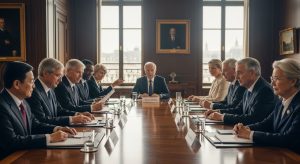By Godson Azu
Should Nigeria, a nation of vast potential and resources, continue to approach South Africa cap-in-hand for support in economic diplomacy? After 30 years of consistent backing for South Africa post-apartheid, the reverse should ideally be the case. Yet, Nigeria’s current foreign policy strategy seems to project an image of deductive diplomacy, necessitating a critical re-evaluation.
Mr. President must lead a strategic recalibration of Nigeria’s diplomatic engagements, focusing on enhancing the country’s image internationally. Rather than presenting Nigeria as a nation in need, the government should emphasize its role as a leader and collaborator on the global stage.
Nigeria-South Africa Relations: A Strategic Partnership
Nigeria and South Africa share robust and strategic diplomatic ties, marked by historical solidarity, particularly Nigeria’s unwavering support for South Africa during the anti-apartheid struggle. This year, the nations celebrate 30 years of formal diplomatic relations established in 1994, a partnership that has evolved to encompass cooperation in political stability, economic development, trade, and social mobility.
South Africa has notably benefited from Nigeria’s massive population and demographics, leveraging investments in telecommunications, retail, and e-commerce. Conversely, Nigeria exports professional labor, creating an imbalance in trade relations between the two nations.
A significant milestone in their partnership is the establishment of the Bi-National Commission (BNC), aimed at managing bilateral engagements. The 11th BNC, co-chaired by Presidents Cyril Ramaphosa and Bola Tinubu in Cape Town on December 2, 2024, focused on strengthening ties across economic, social, and political domains. Nigeria accounts for 64% of South Africa’s total trade with West Africa, underscoring its importance as a trade partner. Discussions also covered visa facilitation and enhancing Nigerian business presence in South Africa.
While the relationship faces occasional challenges, such as xenophobic tensions in South Africa and trade issues, both nations remain committed to collaboration, particularly in advancing African economic integration and reforming global governance systems.
Nigeria’s Bid for G20 and BRICS Membership
At the recent 11th South Africa-Nigeria BNC, Nigeria formally sought South Africa’s support for its bids to join the G20 and BRICS (Brazil, Russia, India, China, and South Africa). Nigeria’s Minister of State for Foreign Affairs, Bianca Odumegwu-Ojukwu, emphasized South Africa’s pivotal role in supporting these aspirations, particularly as it chairs the G20 in 2024.
South Africa has expressed an interest in amplifying Africa’s voice globally but has yet to make a definitive public endorsement of Nigeria’s membership. South Africa’s cautious stance on expanding BRICS, despite past support for countries like Ethiopia, may influence its position on Nigeria’s request.
Significance of G20 and BRICS Membership for Nigeria and Africa
G20
The G20, a forum of the world’s largest economies, focuses on global economic governance. For Nigeria and Africa, its significance includes:
- Economic Policy Influence: Advocacy for fair trade practices, debt relief, and infrastructure investment.
- Access to Development Resources: Opportunities to secure funding for sustainable development and technology transfer.
- Enhanced Representation: Greater African influence in global economic policies alongside South Africa.
- Global Crisis Management: Participation in addressing climate change, health, and food security challenges.
BRICS
As a coalition of major emerging economies, BRICS offers Nigeria and Africa opportunities for:
- Economic Diversification: Expanding trade beyond Western markets and attracting investment in industrial sectors.
- Development Financing: Access to the BRICS New Development Bank for infrastructure projects.
- Multilateral Advocacy: Advancing reforms in global governance systems.
- South-South Cooperation: Collaborating on shared priorities like poverty reduction and technology transfer.
Nigeria’s Challenges and Opportunities
To fully realize its potential in G20 and BRICS, Nigeria must address:
- Governance and Stability: Strengthen institutions, reduce corruption, and ensure policy consistency.
- Economic Diversification: Transition from oil dependency to sectors like technology and manufacturing.
- Infrastructure Deficits: Develop energy, transportation, and digital infrastructure.
- Geopolitical Dynamics: Navigate internal group dynamics dominated by larger economies like China, Russia, and India.
Pathways to Influence
- G20 Engagement: Collaborate with South Africa and participate in Africa-focused initiatives.
- BRICS Membership: Demonstrate readiness through domestic reforms and position Nigeria as a reliable partner.
Conclusion
Nigeria’s ambitions to join the G20 and BRICS align with its role as Africa’s largest economy and most populous nation. However, this requires strategic investments in governance, infrastructure, and economic diversification. A reflective and impactful foreign policy framework is essential to reposition Nigeria as a global leader. By doing so, Nigeria can not only secure its place on these platforms but also champion Africa’s development agenda and amplify its voice on the international stage.




